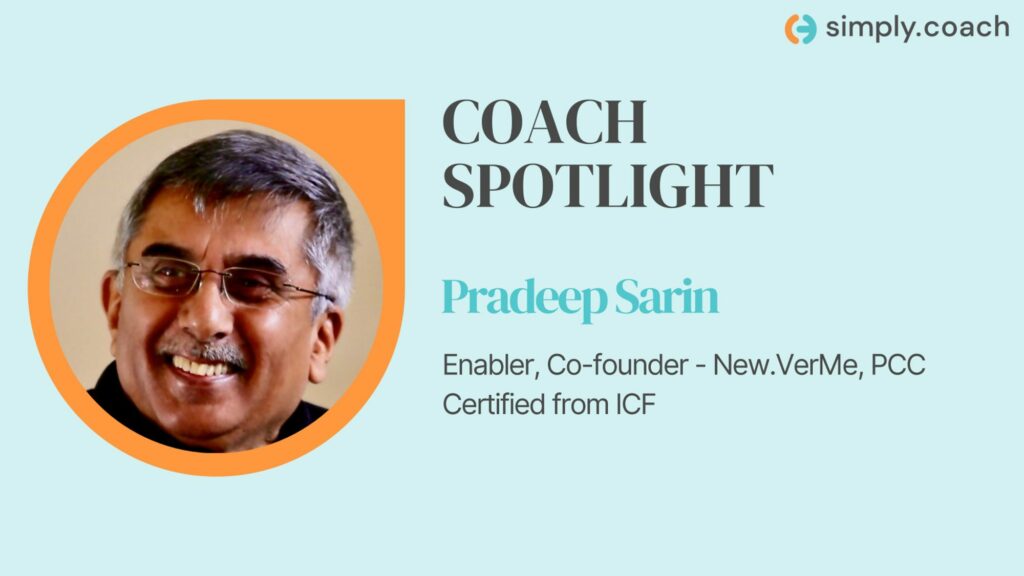In our Simply.Coach Spotlight we talk to expert coaches from around the world, where they share their journey as a coach, their approach towards and perspective on coaching. For this edition of Coach Spotlight, we have invited Pradeep Sarin. Let’s introduce our guest.
Introducing the Coach: Pradeep Sarin
An ICF certified leadership & life coach, Pradeep Sarin is the founder of NewVer.Me, a digital coaching platform offering affordable, accessible, and personalized coaching to young professionals, start-ups, and small businesses. He also coaches with BetterUp and CoachHub.
He has over three decades of experience in the banking sector, and is the ex-managing director at Standard Chartered Bank, Singapore.
As part of the Simply.Coach Spotlight (#SCspotlight) interview series, Pradeep Sarin talks to our co-founder Ram Gopalan about the urgent need to coach young professionals.
The Interview
Q: Thank you, Pradeep, for joining us for this version of the expert series. So, how did you become a coach?
Pradeep: It’s been a fascinating journey. I believe that I was meant to be where I am today.
In my last assignment with a bank, the HR came up to me one day and said, “we’re going to get you a coach.” My first response was, “why?” My mind was unable to accept that I need someone to tell me what to do after spending 35 years in the banking industry. When my coach reached out to me, I put up a wall around myself. And, all credit to my coach, she gradually broke the wall down. When the assignment was over, my only question to her was, “how do I become a coach?”
“Give back phase of my life”
A few years later, I decided that I wanted to transition into what I call the “give back phase of my life”. I got certified, and became a coach, coaching CXOs. Over time, I realized that I enjoyed doing it. But by three or four months into the journey, I figured out that I wanted to concentrate on adding value where it was required the most. The segment, which deals with senior leadership, has already got enough (and even more) coaches whom they can work with. But I wanted to change the model.
Q: A lot of people say that coaching senior leaders is where there’s a huge pyramidal impact. One person changing at the top has an impact on the culture of the organization, right? How do you factor that into your thought process when you’re coaching executives?
Pradeep: I benefited from the process much later in life. If someone young could benefit from the process earlier in their lives, they would be able to define their life journey.
That’s when I decided to start coaching young people pro bono. But I soon realized that clients fail to remain invested if there’s no skin in the game. So, I decided to put a basic price on my service, even if the accumulated amount went to charity.
Gradually, I started approaching a few very senior coaches and BetterUp with my idea of taking coaching to the “mass market”. But my efforts didn’t produce any positive result, until I discovered Simply.Coach. I felt that if the technology is in place, then it’s all about just executing on that dream I had of making coaching more mass market, more affordable, more accessible, and marketing the same. That’s when I signed up for Simply.Coach, used it for a few months, and then shared my plan with fellow coaches. And that’s how New.Ver came into existence.
“Coach for a cause”
Why we want to look at younger professionals is to set them up for challenges or failure that will occur at some point in their life. But if you can adjust your behaviors, if you can always ensure to live your values, then even when you’re at your lows, nobody will be able to tell you that you don’t know how to behave. And that’s what we are trying to do here—preparing these young professionals to face the challenges that the corporate world has in store for them later in their lives.
I loved the process and the transformation I saw in young people. When somebody came back to me and said, “I’m version 2.0 of myself”, that makes me feel great. For me, that’s the return on investment. That’s pretty much everything I coach for.
Q: How is coaching at an early stage of one’s career contributing beyond whatever has been done?
Pradeep: Management couldn’t be bothered with coaching somebody that far down the totem pole. It’s not just worth the investment at that stage. It’s as you get to be more senior that you supposedly become more valuable to the organization and then they want to retain you and then they use different ways to be able to do that. One of them is, “hey, let’s get this person a coach because this person needs to make it to the next level!” They need to iron out certain behavioral traits.
Q: Then how do you convince them of the value of coaching the person at this stage?
Pradeep: What we reason out with them is if they want this pool of future leaders and this pool of talent to grow with them as an organization, they need to invest in them earlier rather than later.
Q: How do you balance that conversation with “quicker churn” or “quicker turnovers” which are happening or “people moonlighting”?
Pradeep: All of that will happen. That’s the reality everybody needs to accept. People will move on. They will not spend their entire career in one organization. But the chances of the individual staying on longer and being more productive at work are higher if this person had a higher level of self-realization and clarity about the goals.
Q: During the coaching process itself, senior professionals often try to bring in a problem-solving approach. But, from what you said, your approaches are more about “where am I?” “Where do I want to go?” “What’s meaningful?”, etc. So, is the nature of conversation more purist coaching at these levels than at senior levels?
Pradeep: I’ve seen both. I think with younger people, it’s more of a purist coaching conversation. With more senior people, it gets into problem-solving. As a coach, I ask them, “do you want me to play consultant today? If yes, I’m going to take off my coaching hat, wear my consultant hat, and let’s talk about your problem. I remind them that their situation, experience, or industry may be different from mine.
Q: A lot of times the L&D team asks for group coaching. It seems to be more efficient in terms of budgets. Also, it seems to me that there is a possibility for peer learning at this level which they might benefit from. Do you come across that construct as well?
Pradeep: Yes! I didn’t believe in group coaching. The reason was—and I still believe to a large extent—that in a group an individual will never sit with a bunch of peers and be fully transparent. They won’t talk about their innermost fear. And that’s the reason why, I think, we stayed away from group coaching as a concept. However, now I’m pivoting in my thinking—we’re now designing something that we call the “Leadership Nursery Program.” There are a couple of group sessions in the beginning and there will be some takeaways from these sessions, which you then discuss with your coach in individual sessions.
Q: How, do you think, is coaching going to be different in the next couple of years in the Indian context, compared to probably 5-10 years back?
Pradeep: There’s a huge opportunity here. It’s just that the concept of coaching is still relatively new in India. It’s still limited to just the senior management level. So, when you look at India we’re faced with multiple issues—how to coach people in their vernacular, how to start addressing this large audience who don’t have anyone to have a conversation with within a safe space, etc. How do we get more and more coaches, therefore, to think about giving part of their time to reaching audiences that don’t have access?
Q: True! And people like you are creating platforms that allow individuals to make the choice of giving back to the industry.
Pradeep: That’s the intent. If we could create a community of coaches who are essentially getting paid a little bit of money but are adding value to the society, we could have a much larger impact on our population.
Watch the Full Interview

Has this inspired you enough to take the big step towards coaching?
Get started with the world’s most secure coaching management platform Simply.Coach!
Sources: LinkedIn, Quotefancy, quotesgram
About Simply.Coach
Simply.Coach is an enterprise-grade coaching software designed to be used by individual coaches and coaching businesses. Trusted by ICF-accredited and EMCC-credentialed coaches worldwide, Simply.Coach is on a mission to elevate the experience and process of coaching with technology-led tools and solutions.
Read More:
From Manager to Master Coach With Jaya Bhateja
Growing With the Flow – With Shruti Swaroop
What Is the Right Path in Life & How Do I Arrive at It?
Journey of An Expert Coach: How Ram Gopalan Found Coaching & His Go-To Coaching Methodology
Using the Vision Board Exercise to Help Your Clients Manifest Their Dreams
Different Types of Coaching Styles & How to Develop One of Your Own

Content Specialist @Simply.Coach
Jayashree Mukherjee is a content specialist by day and a content junkie (on OTT) by night. Passionate about traveling, street food and overturning the underuse of em dashes — she would have been a globe-trotter if she hadn’t been so lazy.









